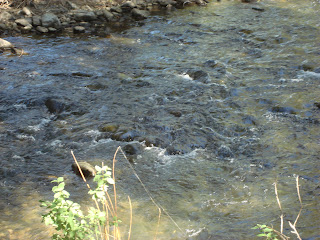Monday, September 10, 2012
Projects Work
"Project Work" is a concept that is becoming more common within the early childhood community as research continues to show children learn best when ideas are integrated surrounding a topic of interest rather than segregated into specific learning areas. Project work consists of extended studies of topics selected based on the interests of the children within a group. Since the beginning of the month I have been on the look out for common threads that may lead to a whole-group project. I began to see some threads coming together on last week's nature walk!
Our nature explorers group has been studying rocks and minerals. During some of our conversations we discussed the concept of "alive" and "not alive". Some of the children's comments during our nature walk brought me back to this concept of what "alive" means for the young child. When we returned from our nature walk I sat down with the children and guided them in a conversation about what "alive" actually means....this is what they had to say!
Collin (age 6): It's like something that can move.
Emmeline (age 4): Like us?
Becton (age 4): That something can move. Sometimes hands are alive because they move their fingers. I think a bee is alive, 'cause it flies and goes buzz...
Ms. Heather: Is there anything alive you see by us?"
Emmeline: The river.
This piece adding to the conversation was unexpected, but as you will ultimately see has become the basis of our study topic!
Ultimately we decided our definition of "alive" consisted of the following: An object is alive if it a) moves without being touched, b) makes a noise, and c) grows.
Now you may be wondering why I didn't correct the children and inform them that an object is alive if it requires air, consumes nutrients, and multiplies. The answer is simply this...
Children will have plenty of time to find answers. However, the further along they go in traditional "education" models they will discover there is limited time to ask questions. I could give children the answers and "teach" them any number of useful and interesting concepts. However, by allowing the children to discover and build their own theories I provide a foundation for children to actually learn how to learn. What this conversation did was show me the children have vivid ideas and an ability to draw conclusions based on scientific "research". What amazingly competent beings these littlest learners really are!
Subscribe to:
Post Comments (Atom)

No comments:
Post a Comment